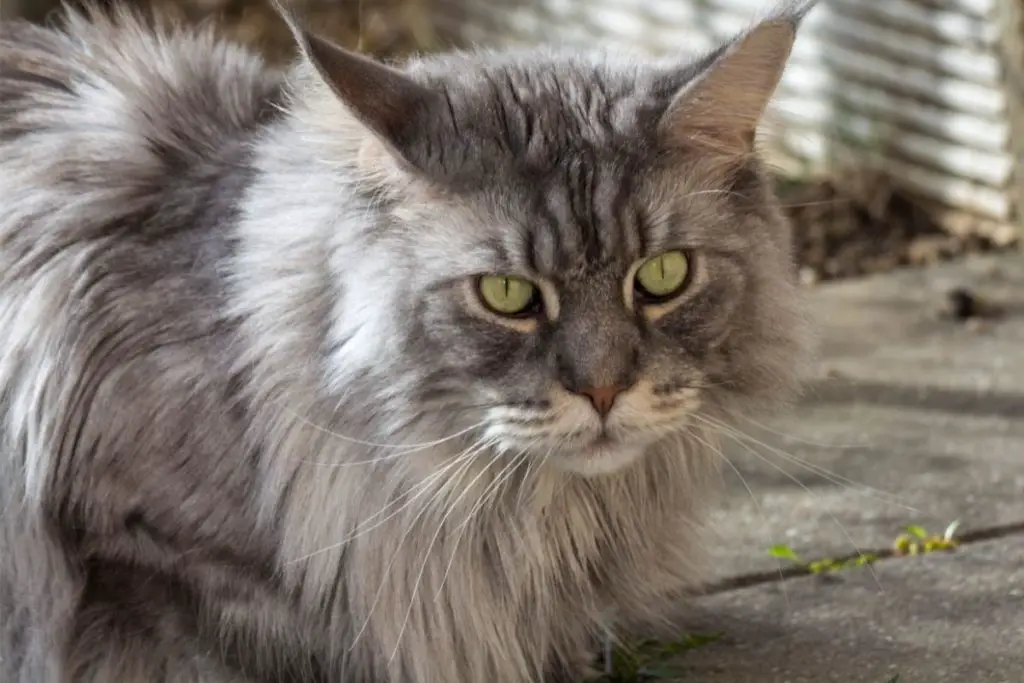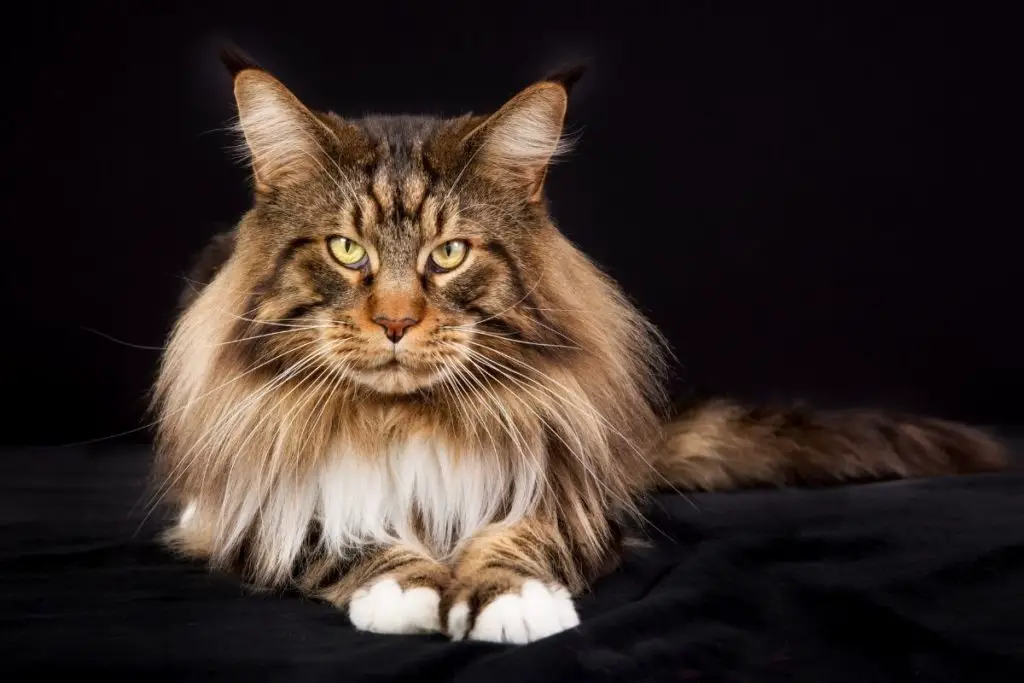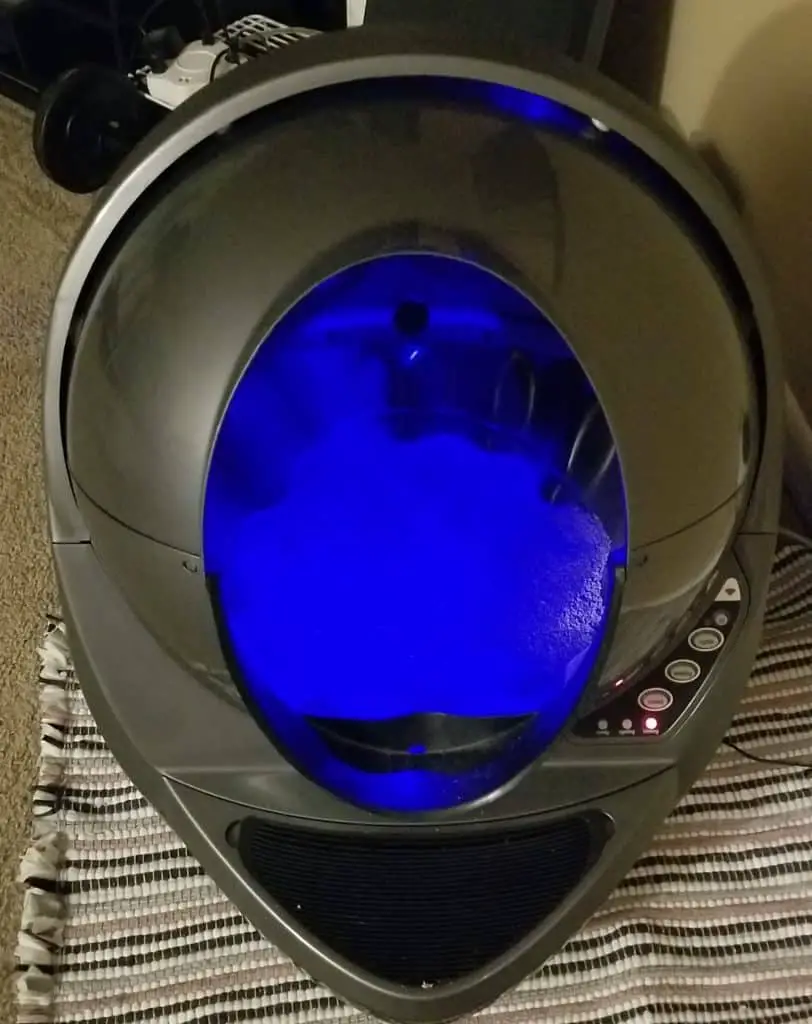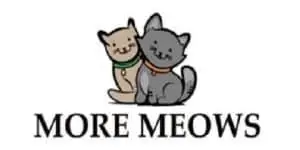More Meows is an Amazon Associate. As an Amazon Associate we earn from qualifying purchases. We may also earn commissions if you purchase products from other retailers after clicking on a link from our site.
Maine Coons are wonderful cats that are highly sought after. Unfortunately, sometimes it looks like Maine Coons can be mean. There are a number of reasons why a person might think their Maine Coon is acting mean. Check out the list below!
1. Stressed Maine Coon
Stress for a Maine Coon can stem from various reasons, but one of the most common reasons is a change in their home environment. Any disruption to the stable home situation can cause the Maine Coon to become stressed and react aggressively towards their owners or other household members.
Maine Coons are one of the calmest and even-tempered breeds of cats. They are known to be docile and affectionate, but they can react with aggression such as biting or clawing when under stress.
Examples of changes that could trigger this reaction are new people or pets in the home. A baby, for example, will disrupt routines and bring new smells into the house.
Another pet, whether a cat, dog, or bird, will also result in new routines and smells in the home. If your Maine Coon feels neglected or threatened by the newcomer, it may well react aggressively to express dissatisfaction.
Another example is where new people, especially children who come into the home who may not know how to act around cats or how to pet or handle them properly, can feel the brunt of teeth and claws from your Maine Coon.
This behavior is easily remedied by educating people on how to handle your Maine Coon and be aware of signs that the cat is unhappy or feeling threatened to avoid injury.

Aggressive Maine Coon
As a cat owner, you need to know the display signs of cat aggression so you can recognize them and move to avoid potential injury to both yourself and the cat.
With Maine Coon cats, they have two types of aggression – offensive and defensive. The offensive posturing is employed when the cat is looking to attack, and the defensive posture is seen when cats feel threatened.
Its important as a cat owner to know the difference between aggressive and defensive posturing so you know what the potential trigger is and then how to diffuse it safely.
According to the ASPCA, these are the physical signs to look for.
| Aggressive Posturing | Defensive Posturing |
| Straight Legs and Upright Stance | Crouching with head tucked in |
| Staring Straight | Tail tucked in and around the body |
| Tail Stiff and Held Straight or Parallel | Ears flattened against the head |
| Raised Back End , Spine Sloping to Head | Open mouthed spitting or hissing |
| Ears Rotated Backwards and Upright | Side on stance not facing forward |
| Hackles Up (Piloerection) | Piloerection |
| Pupils Constricted | Pupils dilated |
| Howling Or Growling | Short quick strikes with front paws |
2. Do Maine Coons Get Stressed?
Maine Coons are very in tune with their owners and their emotional states and the energy in the home in general. When tension arises between people in the home, this can lead to stress and aggressive behavior from your Maine Coon cat.
An example of this is where the adults in the home are fighting, or the relationship is experiencing difficulty. This increased level of tension will result in the Maine Coon becoming uncomfortable and stressed and reacting defensively.
This may mean hiding away or lashing out at family members when they approach, and clawing out at feet or hands that come close could result in scratches. While your Maine Coon may not necessarily attack people, it may display defensive or aggressive posturing.
Some of these obvious signs are growling, hissing, or spitting, ears flattened and displaying their weapons – teeth and claws- to people as they approach.
If this is the scenario in your home, then a good way to avoid this is to reassure your Maine Coon with love and treats, especially if the arguments are generally benign – i.e., general disagreements on issues that are not a dire threat to the stability of the household.
Maine Coons, like most cats, are highly sensitive to changes in the family home environment. When the people in the home aren’t getting along, that negative energy can cause a behavior change.
3. Bored Maine Coon
Lack of stimulation or boredom for an intelligent cat breed, like the Maine Coon, can result in them getting into mischief and acting ‘mean’ to notify you that they need some form of stimulation.
Maine Coons require daily mental exercise and stimulation as extended periods without play, toys, human contact, and puzzles can lead to destructive behavior like scratching furniture, knocking over ornaments, and biting or scratching when petted.
While this behavior may indeed be viewed as mean, you need to assess the level and quality of stimulation your cat is getting daily and possibly increase the variety of activities to keep your kitty interested and positively active.

4. Maine Coon Anxiety
Moving home is a very stressful event for both humans and cats. The boxes and moving of items in the house, creating stacks of boxes with tight clothes rearranging or removing furniture are very disruptive to a Maine Coon and can create anxiety.
If you are moving or have moved into a new home, your Maine Coon may act aggressively as the changes could be perceived as a threat to them. This will immediately evoke a defensive mindset.
It’s very important to plan your move and accommodate your Maine Coon as a family member through reassurance by maintaining affection and the regular routine so that these stable elements in the home are kept consistent. This will reduce the stress of moving and alleviate some of the defensive / aggressive reactions.
5. Maine Coon in Pain
When cats, especially those of even temperament like the Maine Coon, suddenly starts to exhibit negative behavior for no apparent reason like some of those discussed above, then it may be time to consider medical or health reasons.
Sometimes your Maine Coon has accidentally injured themselves while playing; maybe they’ve bumped into an object, causing a tender area on the body, or have landed badly while jumping and have a sore leg. Look for behavioral changes like acting mean, hiding away, intense licking, or scratching in a particular area of their body.
Also, check to see if a spot on the fur isn’t wet or matted, as this could indicate a puncture wound, which would certainly be painful if not treated.
The most obvious indication of pain is a small bite or nip in your hand as you contact an area on the body that is injured, or your Maine Coon suddenly bites you when you stroke them. You need to then proceed with caution and gently examine the area that caused the reaction.
If you suspect an injury or puncture wound, then the best course of action is to consult your vet and get treatment for this source of discomfort. Once treated and the pain subsides, your Maine Coon will be back their usual genial self!
To check out more on the Maine Coon cat, check out this article: Are Maine Coons Legal In New York, California, and Texas?
6. Maine Coon UTI
A urinary tract infection (UTI) in cats is very uncomfortable and can be quite painful if not treated. If your Maine Coon starts to visit the litter box more often than usual, or you can see they struggle to urinate, this could be a UTI and you should contact your veterinarian.
Urinary Tract Infections are not that common in cats, and they occur when bacteria move up the urethra and into the bladder.
Signs to look at are your Maine Coon attempting to urinate frequently and growling or whining when trying to pass urine. A hunched-over posture and urinating outside the litter box, and frequent licking around that area are all indications that there could be a UTI or similar infection.
The immediate remedy is a visit to the vet to perform a urinalysis where the pH level, ketone levels, bilirubin levels, and concentration would be tested from a sample, and then appropriate medication prescribed to alleviate the issue.
Here are some of my favorite cat products
In addition to checking out some other More Meows articles, I hope you’ll check out some of my favorite cat products as well. These are affiliate links, so if you end up using them, I’ll get a commission at no extra cost to you. These are the products I really do find most helpful.
Litter Box: I started out with normal, traditional litter boxes for my cat. Then, I tried this automatic litter box on Amazon (affiliate link), which helped reduce the litter upkeep. Finally, I am now a believer in the Litter-Robot 3 Connect on Amazon (affiliate link). This robotic litter box is not for everyone based on the price tag, but for me the benefits (very little upkeep, works efficiently, clean, mobile app) far outweighed the cost.

Cat Tree: I have purchased a couple of this Amazon Basics Cat Tree on Amazon (affiliate link). My cat spends a lot of time on and around this cat tree, which I position near my sofa. She uses the scratching posts on this cat tree multiple times a day, which means she is not scratching the sofa instead.
Cat Water Fountain: I love this cat water fountain on Amazon (affiliate link). There are three main benefits to having a water fountain like this for your cat. The first benefit is that it keeps water running so that your cat doesn’t need to drink still water. The second benefit is that it filters the water. The third benefit is that it will keep your cat hydrated!
7. Maine Coon Teeth
Teething in kittens is a painful (even for a Maine Coon), uncomfortable process, in felines. As the teeth emerge from the gums, the mouth becomes sensitive. Your Maine Coon may react to teething in a way that you interpret as the cat being mean.
To alleviate this pain, kittens will often bite down on whatever is at hand, including you. While teething is in process, their usual affectionate and passive temperament can change to a more ‘mean’ disposition.
The good news is that teething is temporary, but those little emerging teeth are very sharp and can easily puncture the skin. This is not to be confused with biting out of aggression or a defensive reaction to a threat, but rather pain-induced aggression.
Teething toys and soft food will help your kitten get through this phase, and be sure to move potentially toxic plants like lilies or tulips out of reach.
Electrical cables look particularly attractive and if you find them chewing on furniture, then either move the furniture or the kitten as wooden splinters can add misery to an already unhappy situation.
8. Do Maine Coons Like to be Picked Up?
Yes, Maine Coons enjoy being picked up and held, however, too much stimulation can lead to your Maine Coon appearting to act mean. If you hold or pet your Maine Coon too long they may wiggle and try to get away.
Cats and especially Maine Coons are very affectionate and love being stroked and cuddled by their owners. However, this affection may become excessive at times, and the cat may decide they have had enough.
If you are holding them, they may wiggle or squirm to try and get away from you, and f that doesn’t work or you don’t take the hint, you may find yourself being scratched or bitten.
Your cat has personal boundaries as you do, and when those are not respected, a reaction could be seen as mean results. This is nothing more than your cat telling you that you need to back off or dial it down.
The same would apply when playing with your cat. If you start to see signs of irritation like a twitching tail, ears back, or pupils dilating. These are all signs that your Maine Coon is getting irritable, and considering their arsenal of weapons, you should pay heed and respect their space.
9. Maine Coon Tails
Maine Coon cats don’t enjoy having their tail pulled, and some people who may not be aware of this can be scratched or bitten. A Maine Coon cat’s tail is very sensitive, and pulling it or shaking it can be uncomfortable and even painful if pulled too hard.
Poor treatment of your cat by yourself or others may well result in your Maine Coon reacting with aggression. Continued tail-pulling will result in your Maine Coon expressing some unhappiness with this treatment, and an aggressive reaction may well result.
While gentle tail-pulling can be a play activity, pay attention to signs that this is becoming an irritation and then stop this before your cat has to remind you to do so.
If you want to learn more about Maine Coon cats, check out my article: Are Maine Coons The Smartest Cats? We Find Out.
10. How do you Discipline a Maine Coon Cat?
Usually, a sharp “no” said at negative behavior is sufficient to tell your Maine Coon that this behavior is not ok. Or you can redirect with techniques that reward your Maine coon a treat when the behavior stops.
Since Maine Coons are not naturally aggressive or mean like some other breeds, it takes a lot to get them riled up, so it’s important to know your cat and pay attention to signs that they are getting irritated or annoyed with your actions.
Is it OK to hit your Cat for Discipline?
It’s never a good idea to smack or poke your Maine Coon cat since that is mean human behavior and could hurt your Maine Coon. As a person, you would certainly get annoyed quickly with someone poking or smacking you, and your cat is no different.
This type of behavior is an invasion of space for a cat, and when it becomes excessive, your cat may react with aggression to stop it.
Frequently, smacking your cat could get you smacked back, and since you don’t have razor-sharp claws, you will come off second best in this contest. There are better ways to discipline an intelligent and gentle animal than through violence.
11. Do Maine Coons Get Lonely?
Yes, sometimes Maine Coon cats get lonely. Depending on your cat’s personality and relationship to you it may get lonely. Cats are friendly, intelligent animals, and being alone for extended periods can make your cat cranky.
If your lifestyle is one where you spend a lot of time at work or away from home and there isn’t anyone else at home, consider getting a second cat to keep your Maine Coon company.
Cats thrive on the company as they get to play, eat, and sleep together, alleviating the stress of loneliness.
12. Old Maine Coon Cat
One of the final reasons and saddest is that your cat is getting old and may have some discomfort due to arthritis or similar aging conditions. Older cats (like some older people) lose their patience with people and tend to become less tolerant.
This could then result in some ‘mean’ type behavior exhibited as they may not want to play as much as they used to or will pull away a bit sooner from petting than they used to.
If you know that your cat is approaching old age and in Maine Coons this would be from around the age of eight to then years old, then make accommodations and be aware of this so your cat can live out the rest of its life in a stress-free environment.
Conclusion
In Conclusion, Maine Coons are fantastic cats that, like any cat, can sometimes exhibit aggressive behavior that makes it look mean. I listed 12 reasons why a Maine Coon might look like its acting mean. A few examples of this are due to anxiety, changes in the home, or due to age. If you enjoyed this article, check out a few more:
- 9 Important Reasons Your Maine Coon Meows: Click Here To Read Article.
- 18 Reasons Maine Coons Are The Best Cats: Click Here To Read Article.
- How Big Will A Maine Coon Mix Get? (Eye-Opening Info): Click Here To Read Article.
